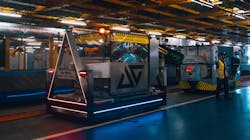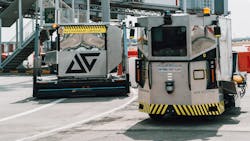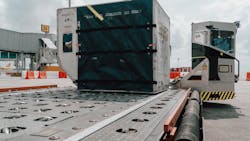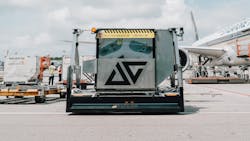Airport Starts Testing Sci-Fi-Looking Autonomous EVs
Aurrigo International plc, a leading international provider of transport technology solutions, has signed a formal partnership agreement with Changi Airport Group (Singapore) Pte Ltd ("CAG") for the continued joint development and testing of the company’s advanced autonomous, electric baggage vehicles, Auto-Dolly and Auto-DollyTug, and its airport simulation software platform Auto-Sim.
The multi-year partnership with CAG provides an opportunity for the further development of Aurrigo’s autonomous solutions at Changi Airport and demonstrations to showcase the technology to other airports and stakeholders.
Airport ground handling faces multiple challenges as the aviation sector recovers post-pandemic. These include staff shortages, as many workers worldwide left the industry over the last few years, the need to turn planes around quickly and safely on the ground, as well as the climate change and air quality challenges facing the sector.
After phase one trials, where the Auto-Dolly traveled through the baggage handling area and along the airside roadways, the team has now embarked on phase two of the trial, to test the safe operations of the Auto-Dolly at the aircraft stand. Due to its small footprint and tight turning radius, the Auto-Dolly can maneuver itself precisely next to an aircraft and Ground Service Equipment (GSE) items.
In addition, with its capability to transfer a Unit Load Device (ULD industry-standard luggage container) directly to and from the Skyloader equipment which loads the plane. This means that current processes involving additional equipment can be changed and operational steps can be eliminated, resulting in further savings to manpower and equipment.
Changi Airport is the first airport in the world to test this equipment’s ability to perform autonomous loading and unloading of ULDs at the aircraft stand.
This partnership follows on from the agreement with CAG announced on 28 October 2022, for the next phase of development of Aurrigo’s Auto-Dolly. Aurrigo’s Auto-Dolly has been in live, real-world testing at Changi since February 2022. Demonstrating that these electric, autonomous, baggage vehicles eliminate emissions at the point of use, improve the efficiency of baggage handling and allow the deployment of scarce staff resources elsewhere in the airport.
"We have worked closely with the team at Changi Airport for several years and this partnership cements our collaboration to bring the best automated solutions to airlines and airports, enabling them to improve operational efficiency, cost and safety and sustainability. We have been testing the electric and autonomous Auto-Dolly in real airport environments since 2018 and we have used that testing and customer feedback to continuously develop a vehicle that can operate safely and efficiently in the safety critical environment of an airport apron. Changi Airport has won countless awards for quality and is famed for implementing pioneering new airport related technology. In CAG we have an excellent partner to develop the technologies and infrastructure that will bring a revolution to aviation ground handling."
David Keene, CEO of AurrigoThe development and testing of Aurrigo’s autonomous vehicles is partially funded by the Civil Aviation Authority of Singapore (CAAS) through its Aviation Development Fund (ADF). The ADF supports initiatives to improve productivity in the Singapore aviation sector through the use of innovative solutions.
Aurrigo Autonomous Vehicles
Aurrigo started its autonomous division in 2015 and has been continuously refining the technology, focussing on areas where there is a demonstrable need and benefit to customers and in operating environments where it can be deployed realistically in the near future.
Auto-Dolly
Testing in live airport environments began in 2018 at London Heathrow Airport in the UK with a converted conventional manually towed baggage dolly, that Aurrigo retrofitted with an electric drivetrain and autonomous vehicle sensor suite. Using its 30-year history of automotive experience the company built on the customer feedback from that prototype, to create the first bespoke Auto-Dolly vehicle, designed from the start to be optimized for an electric drivetrain and autonomous operation.
This iterative design process is key to Aurrigo’s success in working with business partners, meeting the specific needs of them and the wider industry. This has resulted in a vehicle that is significantly lighter than the converted dolly, due to an optimized design, which reduces energy consumption during operation.
The electrically powered Auto-Dolly is designed to meet the needs of airport operators around the world, by eliminating CO2 and noxious emissions at point of use, which assists airports in meeting regulatory and their own CSR requirements. The autonomous capability allows operators to redeploy scarce staff resources in other areas, particularly important when many are struggling to source enough security-cleared staff to cover all operations. The Auto-Dolly has been developed to improve efficiency, not just by doing the same role better, but by revolutionizing baggage handling on the ground, eliminating intermediate steps, processes, and machinery. This facilitates improved baggage arrival speed significantly, which has the potential to reduce aircraft turnaround times.
Auto-DollyTug
Changi Airport has also been testing Auto-DollyTug, which replaces a traditional diesel tractor-type baggage hauler, with an electrically powered, autonomous vehicle, which can carry a ULD (aviation industry standard luggage container) on top of the vehicle, as well as towing up to four traditional, unpowered luggage dolly’s. This ability to carry a ULD, as well as tow traditional dollys, is unique, and brings additional space saving in the frenetic environment of airport baggage halls and in the safety-critical spaces next to live plane operations, in comparison to tractor-type tugs in use today.
Auto-Sim
To maximize the efficiency of operations, Aurrigo has developed a unique software simulation package, Auto-Sim, which allows airport operators to redesign operations for maximum efficiency. The software can model the use of both traditional and autonomous vehicles to improve efficiency and reduce costs. In one airport in the USA, it has shown how unnecessary equipment purchases could be avoided, by demonstrating how operations could be successfully carried out on a terminal extension without additional vehicles on the fleet.
30 Years of Manufacturing Prowess
Aurrigo has a pedigree in vehicle and component manufacturing stretching back 30 years, with a history of creating components for the finest automotive brands in the industry, including Aston Martin, Jaguar Land Rover, McLaren, and Rolls Royce. The company worked on its first fuel cell electric and battery electric vehicles 25 years ago, over a decade before any mainstream electric vehicle was launched.
“Similar to major airports throughout the world, recruiting enough ground handling personnel and drivers to support our growth is a challenge. We have been encouraged by Aurrigo’s innovative autonomous technologies to help address these issues, and we’re excited to partner Aurrigo in joint development and testing of these solutions in the real world.”
Ms Poh Li San, SVP of Terminal 5 Planning, Changi Airport GroupThe Coventry-based Tier 1 supplier has been using that vehicle manufacturing and advanced component knowledge and capability to build innovative, customer-focused, autonomous, electric baggage vehicles specifically to meet the challenges faced by the aviation industry.
Commenting on how their automotive experience helps them in their aviation division, David Keene, CEO of Aurrigo, commented: “The effectiveness of the Auto-Dolly and Auto-DollyTug which are being real-world tested and continuously developed in our partnership with Changi Airport are a result of the 30-year history of our company and the unique combination of expertise we have across our three divisions.
"Our roots are in high-end automotive solutions, electronics, and software where we are a trusted supplier to discerning and prestigious brands. Our work with autonomous technology over the last eight years brought all these skills together to create state-of-the-art aviation ground handling autonomous EVs, that our customers want, and importantly tell us they need to solve global aviation industry challenges.”



